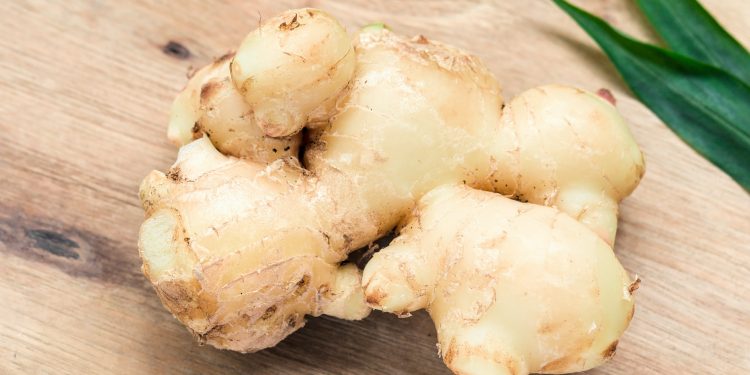Ginger is a native spice of Southeast Asia, and is widely used as folk medicine and delivers favorable results. Ginger is a useful and beneficial herb. Since ancient times, people have used it in food cuisine and for its medicinal properties. Ginger is a root, and it is loaded with bioactive compounds and nutrients that are beneficial for your brain and body. In this article, you will learn about the research-based ginger benefits regarding health, its nutritional components, and risk factors of consuming ginger.
The ginger plant has natural chemicals that play a significant role in improving your health. People can use ginger in cooking either fresh or dried, according to their taste. Moreover, some people also use ginger supplements for their health.
Here are the health benefits of ginger:
Ginger Benefits

Ginger and turmeric belong to the same family, and it can be a nutritious and healthy addition to your healthy diet that helps you in maintaining physical health. The benefits of ginger are given in the following section.
1. Treatment of Nausea
Ginger is considered the treatment of nausea and sickness in pregnancy. According to studies, ginger may be helpful in vomiting and nausea after surgery. Moreover, ginger has a history of seasickness remedy, and it can also be used as prescription medicine.
Ginger is also beneficial for pregnant women, such as morning sickness, that causes nausea. The systematic review of studies suggests that about 1.1 – 1.5 grams of ginger can help in the reduction of symptoms of nausea.
2. Ginger Can Relieve Muscle Pain
Ginger shows effectiveness in muscle pain caused by workout and exercise. People can use 2 grams of ginger daily for about 10 to 11 days to reduce muscle pain due to elbow exercises.
Although ginger does not provide immediate relief in pain, it may reduce muscle soreness and pain after exercise gradually. Ginger has anti-inflammatory properties that prevent and heals the inflammation in muscles.
3. Effective for Osteoarthritis
Osteoarthritis leads to the degeneration of joints in the body, due to which a person has symptoms like stiffness and joint pain.
Ginger has powerful medicinal effects that help control osteoarthritis disease. Joint pain can be cured and decreased with ginger. Ginger can relieve swelling and osteoarthritis due to its anti-inflammatory properties.
A controlled trial of people with osteoarthritis, people who used ginger extract, reported a decrease in pain and did not require pain killer medications.
Another study reported that people who apply a combination of ginger, cinnamon, mastic, and sesame oil on the affected area, it leads to diminishing stiffness and pain in patients with osteoarthritis.
4. Improves Digestion
In the process of digestion, some foods and chemicals may cause gas in the intestinal tract that causes discomfort. Studies indicate that enzymes in ginger provide relief by breaking these and expel the gas.
Ginger has beneficial effects in improving the activity of pancreatic lipase and trypsin that improves digestion. Furthermore, ginger enhances the movement of components in the digestive tract that prevents or relieves constipation.
Also read: Food Nutrients to Improve your Immune System
5. Regulates Blood Sugar and Heart Problems
A recent study suggests that ginger has anti-diabetic properties because it decreased fasting blood sugar by 12% in people with type 2 diabetes who consumed 2 grams of ginger powder per day.
Ginger can help moderate blood sugar and maintain insulin in the body. However, more extensive studies and research is needed to find its effects on blood sugar.
In a period of 12 weeks, ginger also led to an improvement in HbA1c levels and ApoB/ApoA-I ratio, leading to a marked decrease in oxidized lipoproteins. These are possible risk factors for heart disease, and when ginger may help in controlling the, and the study suggests you can avoid serious heart problems.
6. Reduces Cancer Growth
Cancer is a severe disease that causes uncontrolled growth of abnormal cells in the body. Ginger extract has been used as an alternative cancer treatment.
The study says ginger can decrease the growth of cancer in the body. Some cancers like gastric, liver, skin, prostate, colon, and breast cancers can be reduced by ginger. The anti-cancer properties of ginger are attributed to the presence of 6-gingerol found in raw ginger.
It relieves cancer patients during their chemotherapy treatment, and using 1.5 grams of ginger may relieve nausea after chemotherapy and surgery.
7. Lowers Risk of Infections
Ginger is full of antioxidants properties that can protect the body from damages caused by blood pressure, heart disease, and lung disease, etc. It prevents stress and damage to your body’s DNA.
Fresh ginger has a bioactive substance, gingerol that lowers the risk of infections and inhibits the growth of bacteria.
Ginger is effective against the oral bacteria that may cause inflammatory diseases in the gums, such as gingivitis and periodontitis. Fresh ginger may also be effective against the RSV virus (Human Orthopneumovirus), a common cause of respiratory infections.
8. Alleviates Cold and Flu
Many people, since ancient times, have used ginger as an anecdotal from cold and flu. The research studies have portrayed that fresh and dried ginger has a conclusive effect on the respiratory virus.
Fresh ginger protects your respiratory system, and a small study suggests ginger can be used as herbal medicine.
9. Reduces Menstrual Pain
Ginger is most effective in reducing menstrual pain and cramps. Ginger has been used as traditional pain relief by women during the menstrual cycle.
In a study, women took 1 gram of ginger powder for the first three days of their menstrual period, and ginger was able to reduce pain as effectively as pain killers.
You can consume a few sips of ginger tea to soothe the pain and nausea during your menstruation. However, you should always consult your doctor before using supplements and herbal treatments, as they may interfere with your current medications.
10. Boosts Weight Loss
Studies show intake of ginger with plant extracts may aid in weight loss. Ginger has been linked to weight management and assists in giving you a balanced and healthy lifestyle.
11. Useful for Alzheimer’s Disease
Chronic inflammation and oxidative stress stimulate the process of aging and age-related cognitive decline, which may cause Alzheimer’s disease. The bioactive compounds and antioxidants in ginger lead to an inhibition in the inflammatory response of the brain.
Also read: Flu And Pneumonia Shots Can Lower Risk Of Alzheimer’s Disease, Heart Attack, And Stroke
The ginger extract also had significant effects on improving working memory and reaction time for middle-aged women. Moreover, ginger can also protect people against the decline in brain functions with increasing age.
Nutritional Components of Ginger

Ginger is rich with minerals and vitamins. It has numerous antioxidants and anti-inflammatory properties that provide health benefits in terms of body functions and immunity. Here are the nutritional components of a tablespoon of fresh ginger.
- 4.8 calories
- Carbohydrates (1.07 g)
- Dietary fiber (0.12 g)
- Protein (0.11 g)
- Fat (0.05 g)
- Sugar (0.1 g)
Additionally, the vitamins and minerals found in trace amounts in ginger are:
- Iron
- Vitamin B3 and B6
- Potassium
- Vitamin C
- Magnesium
- Phosphorus
- Zinc
- Folate
- Riboflavin
- Niacin
The human body requires a variety of nutrients and minerals for the functioning of the body system, and ginger is a source of various nutrients. The nutrients and bioactive compounds are helpful for the brain and physical systems.
Risk Factors of Ginger
Ginger benefits are a lot if we start counting them. The United States Department of Agriculture considers ginger nutritious and safe when consumed in optimal amounts. However, higher doses of concentrated supplements in the ginger root have side effects like,
- Heartburn
- Diarrhea
- Gas
- May lead to miscarriage
- Mouth irritation
- Stomach Ache
- Rash on skin
As a generic rule, you should always discuss with your doctor before taking any dietary supplements because they might interact with your prescription medicines and might cause serious side effects.
In a Nutshell
Ginger has been used since old times as alternative medicine that has applications in daily life for your well-being. Ginger can be used fresh, dried, chopped, powdered, or even as an oil in a variety of foods and cosmetics.
The cosmetic industry has also used ginger in their products because of the unique flavor and fragrance of natural oils. These were the ginger benefits that can help us get a good health.
Also read: Papaya Fruit: Health Benefits and Nutritional Components
Keep visiting Health Archives for Health News and Updates.












